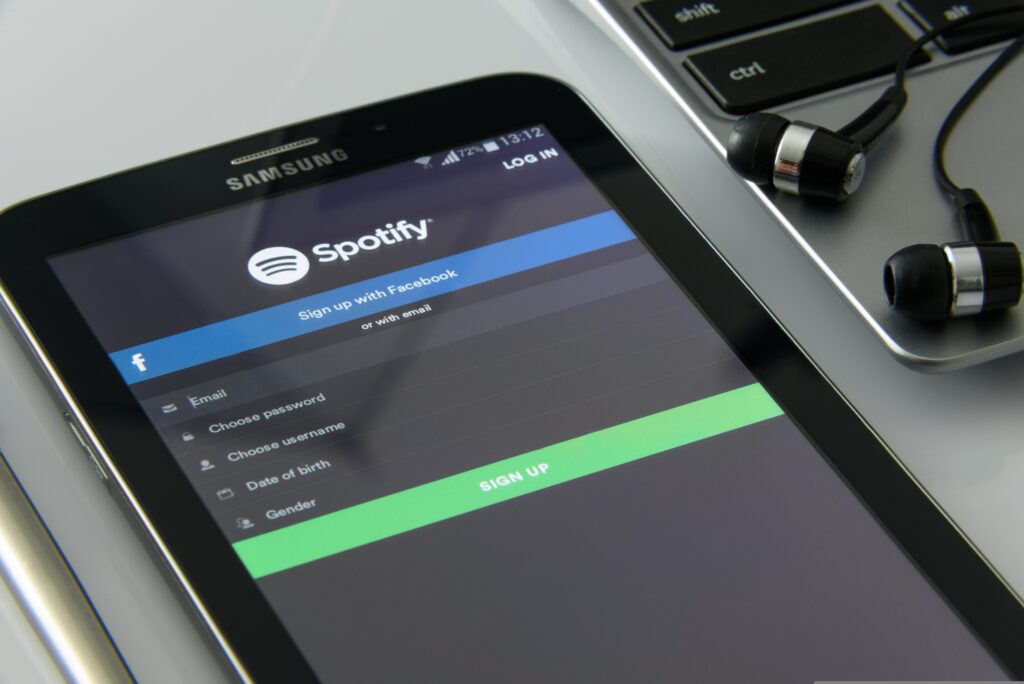
Intro
Have you ever wondered how do musicians make money?
Are you an aspiring musician looking to become a top earner?
This blog post will be the answer to your questions.
We will discuss seven of the best ways for musicians to make money and become successful.
From selling merchandise to streaming on platforms like Spotify, you will find all the tools you need to increase your income as a musician.
Keep reading to find out more!

1) Selling merchandise
Selling merchandise is one of the most popular and effective ways for musicians to make money.
It not only allows you to increase your income but also serves as a marketing tool to promote your brand and connect with your fans on a deeper level.
Merchandise can come in various forms, from t-shirts and hoodies to posters and stickers.
The key is to create products that resonate with your fans and represent your unique style and image.
Your merchandise should reflect your music and create a sense of belonging for your fans, making them proud to be a part of your journey.
One of the best ways to sell your merchandise is through your website or an online store.
This allows you to reach a wider audience and makes it easy for fans to browse and purchase your products.
You can also use social media platforms like Instagram and Facebook to showcase your merchandise and direct your fans to your online store.
Another effective way to sell merchandise is at your live performances.
Setting up a merchandise booth at your concerts allows fans to see and touch your products in person, creating a stronger connection and increasing the likelihood of a purchase.
You can also offer exclusive merchandise or limited edition items at your shows to create a sense of urgency and exclusivity.
To maximize your merchandise sales, consider bundling items together or offering special promotions.
For example, you can offer a discounted price for purchasing a t-shirt and an album together.
This not only incentivizes fans to buy more but also helps you generate more revenue.

2) Licensing music for films, TV, and ads
Licensing your music for films, TV shows, and advertisements can be an incredibly lucrative way to boost your income as a musician.
In fact, it has the potential to be one of the most lucrative avenues for making money in the music industry.
So, how does it work?
When your music is licensed for use in a film, TV show, or advertisement, you essentially give permission for your music to be played in these mediums.
In return, you receive a licensing fee or royalty payment.
This can vary depending on the scale and prominence of the project, but it can range from hundreds to thousands (and even tens of thousands) of dollars per use.
Licensing your music in this way has several benefits.
Firstly, it provides exposure to a wider audience.
When your music is played during a popular TV show or featured in a major film, it can attract new listeners who may not have otherwise discovered your music.
This exposure can lead to increased fanbase growth and potentially even more opportunities for licensing in the future.
Secondly, licensing your music for visual media can help you build a strong and recognizable brand.
When your music is associated with a particular TV show or film, it becomes ingrained in the viewer’s mind and can be instantly recognized.
This association can lead to increased album sales, streaming numbers, and overall recognition as an artist.
Another great thing about licensing is that it can generate ongoing royalties.
When your music is licensed for a TV show, for example, you will typically receive a payment upfront, but you may also receive additional royalties based on how often the show is aired or streamed.
This passive income can provide a steady stream of revenue even when you’re not actively promoting or touring.
To get started with licensing your music, you can reach out to music supervisors, licensing agencies, or even directly contact production companies.
Building relationships with these industry professionals can help increase your chances of landing licensing opportunities.
You can also consider joining a music licensing platform, which connects musicians with filmmakers and advertising agencies in need of music for their projects.

3) Royalties from streaming platforms
As a musician in today’s digital age, one of the best ways to earn money and reach a wider audience is through streaming platforms.
With the decline of physical sales, streaming has become the primary method for music consumption.
Platforms like Spotify, Apple Music, and Amazon Music offer a massive audience and the potential for significant royalty earnings.
When your music is streamed on these platforms, you earn royalties based on the number of plays your songs receive.
While the exact amount you earn per stream may vary depending on the platform and your specific distribution deal, the potential for consistent income is immense.
Streaming platforms operate on a revenue-sharing model, meaning they allocate a percentage of their total revenue to be paid out to artists.
This means that as the number of streams increases, so does your potential earnings.
The key to maximizing your royalties is to build a loyal fan base and promote your music across various platforms and playlists.
Collaborating with popular artists or securing placement on influential playlists can significantly boost your streaming numbers and ultimately your earnings.
It’s essential to invest time in networking, marketing, and connecting with music industry professionals to increase your visibility and attract new listeners.
While streaming may not yield the same per-stream revenue as physical sales, the potential for long-term and passive income is undeniable.
With streaming, your music remains accessible to listeners around the world 24/7, allowing for a continuous flow of royalties without the need for physical distribution.
To further increase your streaming revenue, consider diversifying your distribution strategy.
While major platforms like Spotify and Apple Music are crucial, don’t overlook smaller platforms or niche streaming services that cater to specific genres.
By expanding your presence across multiple platforms, you can reach a broader audience and generate more income.

4) Touring and live performances
Touring and live performances are essential for musicians looking to make money and connect with their audience on a more personal level.
While the music industry has shifted towards digital platforms, there is still a high demand for live music experiences.
In fact, many musicians earn a significant portion of their income through touring and performing live.
When you go on tour, you have the opportunity to showcase your talent, build a loyal fan base, and sell merchandise directly to your audience.
Live performances create a unique and intimate experience for fans, allowing them to connect with your music in a way that cannot be replicated through recordings or streaming platforms.
The energy and excitement of a live show can create a lasting impression on your audience and encourage them to support you in various ways.
One of the most significant sources of income from touring comes from ticket sales.
Depending on your popularity and the size of the venues you perform at, ticket sales can generate a substantial amount of revenue.
To maximize your earnings, it’s crucial to choose the right venues and set ticket prices that are fair for both you and your fans.
Consider factors such as capacity, location, and the demographics of your target audience when planning your tour.
In addition to ticket sales, live performances also provide an opportunity to sell merchandise.
Without CDs and physical sales declining, merchandise sales have become a crucial revenue stream for musicians.
Fans love to have tangible items that represent their favorite artists, and live shows offer the perfect platform for selling merchandise such as t-shirts, posters, and even limited-edition items.
Make sure to set up a merchandise booth at your concerts and promote your products during your performance to encourage fans to make a purchase.
Another benefit of touring and live performances is the potential for additional income through sponsorships and endorsements.
As your popularity grows, brands may approach you for partnerships and promotional opportunities.
This can include anything from wearing their clothing on stage to promoting their products on your social media channels.
These sponsorships can provide a significant financial boost and open up new avenues for collaboration and exposure.
Overall, touring and live performances remain a key component of a musician’s income.
They offer a unique opportunity to connect with fans, showcase your talent, and generate revenue through ticket sales, merchandise, and potential sponsorships.
While the music industry continues to evolve, the demand for live music experiences remains strong, making touring an essential aspect of a successful musician’s career.

5) Sponsorship and endorsements
Sponsorship and endorsements play a significant role in helping musicians boost their income and gain valuable exposure.
Brands and companies are always on the lookout for influential artists to endorse their products or collaborate on marketing campaigns.
This creates an exciting opportunity for musicians to not only earn money but also expand their fan base and connect with new audiences.
One of the most common forms of sponsorship for musicians is endorsement deals with instrument manufacturers.
Whether you’re a guitarist, drummer, or keyboardist, partnering with a reputable instrument brand can provide you with high-quality gear, financial support, and exposure.
It’s a win-win situation – you get to use top-notch equipment, and the brand benefits from your association and endorsement.
But endorsements go beyond just instruments.
Musicians can also collaborate with clothing brands, lifestyle companies, and even non-music related businesses that align with their image and values.
For example, if you have a distinct fashion style, partnering with a clothing brand can be a great way to showcase your personal brand and earn money through collaborations or brand ambassadorships.
Social media has become a powerful platform for sponsorship and endorsements.
Many musicians are approached by brands to promote their products on social media channels like Instagram, Facebook, and YouTube.
With a large following and engaged audience, you can negotiate partnerships and sponsored content that aligns with your image and interests.
From featuring a product in a music video to posting sponsored content on your feed, social media endorsements can provide a steady stream of income and exposure.
In addition to traditional sponsorship deals, musicians can also explore opportunities with event sponsors.
Whether you’re playing at a festival or hosting your own concert, reaching out to local businesses for sponsorship can help cover costs and enhance the overall experience for your fans.
By promoting these sponsors during your event, you create a mutually beneficial relationship that can lead to long-term partnerships and financial support.
Remember, sponsorship and endorsements should align with your brand and resonate with your audience.
It’s important to be selective and choose partnerships that genuinely reflect your values and musical style.
Authenticity is key to maintaining trust with your fans and ensuring the success of your sponsorship and endorsement endeavors.
So, keep creating amazing music, building your brand, and attracting the attention of potential sponsors and endorsers.
The possibilities are endless!

6) Crowdfunding and fan support
Crowdfunding and fan support have revolutionized the way musicians make money and connect with their audience.
With the rise of platforms like Kickstarter, Patreon, and GoFundMe, musicians now have the ability to directly engage with their fans and raise funds for their projects.
Crowdfunding allows musicians to present their ideas, whether it’s a new album, a music video, or a tour, and ask their fans to contribute financially to make it a reality.
Fans can pledge different amounts of money in exchange for various rewards, such as exclusive merchandise, behind-the-scenes access, or even private concerts.
This not only provides financial support but also creates a sense of community and collaboration between the artist and their fans.
Fan support goes beyond just crowdfunding campaigns.
Musicians can create a sustainable income by building a loyal fan base and leveraging their support.
This can be done through various means, such as creating a fan club or membership program.
Fans can pay a monthly or annual fee to gain access to exclusive content, early access to tickets and merchandise, and even meet and greets with the artist.
By offering unique and valuable experiences to their fans, musicians can establish a stable and consistent income stream.
Engaging with your fans is key to fostering their support.
Interacting with them on social media, responding to comments, and even organizing fan meetups or online Q&A sessions can strengthen the bond between the artist and their fan base.
This connection not only leads to increased fan loyalty but also encourages fans to financially support the artist through various channels.
It’s important to note that crowdfunding and fan support require a proactive approach from the musician.
Building a strong online presence, consistently creating and sharing content, and regularly engaging with your fan base are crucial to the success of these endeavors.
By fostering a strong relationship with your fans and continuously providing them with valuable experiences, you can create a sustainable income stream and thrive as a musician.

7) Teaching and coaching others in the industry
As a musician, you have a wealth of knowledge and experience that can be valuable to others in the industry.
Teaching and coaching is not only a great way to share your expertise, but it can also be a lucrative source of income.
One of the most popular ways to teach others in the music industry is by offering private lessons.
Whether you’re a skilled guitarist, pianist, or vocalist, there are aspiring musicians out there who would love to learn from you.
By offering one-on-one lessons, you can cater to the specific needs and goals of each student, providing personalized guidance and mentorship.
This can be done in person or online, depending on your preference and the availability of your students.
In addition to private lessons, you can also consider teaching group classes or workshops.
This allows you to reach a larger audience and share your knowledge with multiple students at once.
Group classes can be a fun and interactive way to teach music theory, technique, or even songwriting.
Workshops, on the other hand, can focus on specific topics or skills, such as improvisation or music production.
These types of classes and workshops can be offered in person or through online platforms, providing flexibility and accessibility for your students.
Another avenue for teaching and coaching in the music industry is through online courses and tutorials.
With the rise of digital platforms, more and more musicians are turning to online learning to improve their skills and knowledge.
By creating and selling your own online courses or tutorials, you can reach a global audience and provide valuable resources for aspiring musicians.
This can be a passive income stream, as once the course or tutorial is created, it can continue to generate revenue without much additional effort on your part.
